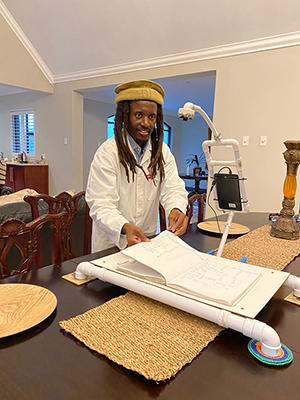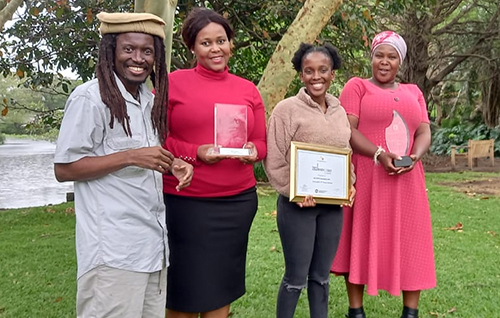News & Events
Unisa innovation set to bridge digital divide, improve quality of education
The digital divide in South Africa is indisputable, with most of its population without access to computer hardware, a limited understanding of digital means of communication and experiencing internet affordability challenges.
This is particularly the case for communities in rural areas, who are compelled to travel long distances to urban areas – and therefore spend more money – to access information and communication technologies.
The Digitiser
To tackle the digital divide problem, Mbuso Ngcongo identified a need for a computer vision application in July 2018. To bring this idea to reality, he was encouraged to register for a Bachelor of Science in Computing (BSc) at Unisa, to learn how he could implement his solution to bridging the digital divide in South Africa. Three years later, his idea has turned into an innovation, called “The Digitiser”.
The Digitiser is a portable scanner, built from recycled plastic and other waste materials, with an effective optical character recognition (OCR) function. It can be operated through a mobile phone, laptop or computer on which the application has been installed. The Digitiser enables students to effectively scan and submit their assignments, wherever they are.
"The innovation is highly interactive,” says Ngcongo. “Equipped with a high-power processor, it is an application of machine learning. Like a child it is very eager to learn and ever so willing to help us do things better, faster and easier.''
His goal is to use technology to improve the quality of education and, in particular, target learners in the Foundation Phase to facilitate effective teaching.

Mbuso Ngcongo demonstrating The Digitiser by scanning a document
Qala, qhubeka, qeda
Ngcongo lives by his mother’s principle, that is, the three Qs: qala, qhubeka, qeda, meaning one should start, persevere, and always finish what one has started, regardless of the circumstances. He had enrolled at another university in 1997, but could not finish, because he did not realise how much of a privilege it was to study at a university at that time.
“When I dropped out, several people advised me to go back and complete my studies. Two of them are a Durban-based architect and businessman, Yusuf Patel, and the late prominent attorney, Suleman Lockhat, who mentored me like his son,” Ngcongo reflects. Today, at 48 years old, he is in his final year for the BSc degree.
In addition, he has been running a successful consulting business since 2002, developing database systems for small businesses in KwaZulu-Natal and Gauteng.
From idea to innovation
Ngcongo could commence on the journey of turning his idea into an innovation after he was selected as the winner at the annual Unisa Research and Innovation Showcase, in 2019, hosted by the Directorate of Innovation, Technology Transfer and Commercialisation (DITTC).
Through the DITTC’s funding and support services, Ngcongo has been able to protect his innovative idea and had the opportunity to partner with stakeholders to develop and test a working prototype. “A prototype, whether of low or high quality, is a beautiful thing to have, because it allows other people to see, touch and interact with the product,” he says. “When people interact with a prototype, they provide important feedback, and this helps to improve the quality.”
Ngcongo further adds that the support, training and constructive criticism he received during the adjudication process, along with the access he had to highly skilled academics, industry experts and mentors, cannot be assigned any price tag. Ngcongo also emphasises that participating in the student exchange programme to France, organised by the DITTC, remains one of his important highlights.
Timely innovation
The exchange programme took place at a pivotal time in modern history. “Immediately after we returned from France, in December 2019, the world changed drastically, due to the COVID-19 pandemic,” says Ngcongo. “The world was completely locked down; children could no longer go to school and our lives would never be the same.”
To put him in a better position to help children learn while at home, Ngcongo enrolled for a virtual short course in early childhood development during the 2020 lockdown period. After that, he recruited and trained seven young and enthusiastic volunteers, including unemployed Unisa postgraduates qualified in Foundation Phase education, and a social worker.
“We organised ourselves and formed a non-profit organisation, Watoto Wazania NPC, to structure our offering,” says Ngcongo. “We supported these graduates financially, to enable them to register with the South African Council of Educators and the Department of Social Development, in order for them to be able to practice their skills and help us in the work we do.”
To build a prototype, with limited financial resources, they used recycled material (broken computers) and repurposed waste material (plumbing pipes) to create a learning and teaching toolkit.
During their go-to-market strategic phase, it was soon discovered that children need a lot of attention, and to help with this The Digitiser was empowered to analyse the handwritten work done by children. Moreover, The Digitiser could give observations about the children’s drawings, read their writing, conduct an error analysis and provide feedback that could help educators to teach them more effectively.
“When other parents heard about the learning and teaching toolkit, they wanted it for their children too,” he says. From April to June 2021, Ngcongo and his team successfully launched a pilot project. When interest in the product increased, they took the project to a primary school and an early childhood development centre, after the COVID-19 regulations were eased.
In total, Ngcongo and his team interacted with more than 526 children between the ages of three and 13 during the three-month pilot project. To cope with the scale of the project, they even invited some of the learners’ parents, mostly young adults, to help build additional prototypes.

Mbuso Ngcongo, Sindisiwe Sibiya - Social Worker (BA Health Science & Social Services, Unisa 2015), Khanyiswa Ngcongo - Grade 11 learner, Nokuthula Helen Mzizi - Educator (PGCE Unisa 2020)
Taking the initiative beyond SA’s borders
During the design phase, Watoto Wazania NPC participated in the Moses Kotane Institute Innovation Awards and won the second-place prize in the Education category on 15 April 2021. The funding provided them with more financial resources to enhance the development cycle.
On 15 June 2021, they demonstrated their innovation to the former Minister of Communications and Digital Technologies, Hon Stella Ndabeni-Abrahams. “It is our plan to present the toolkit to the Department of Basic Education and to discuss how this innovation can help the department to achieve its goals and aid in bridging the digital divide,” says Ngcongo. As part of their vision, they want to scale up the initiative beyond geographic borders to combat the digital divide globally.
Their short-term goal is to inspire learners to develop an appetite for mathematics and science studies. “We have set systems in place to monitor their progress and to ensure that no one is left behind by the time they graduate in Grade 12, in December 2033,” says Ngcongo.
His ambition is to have The Digitiser initiative housed within the university, in a sustainable environment, so that, one day, their university-based offices would be occupied by someone, whom they have helped, by solidifying their foundation studies.
* By Mpho Moloele, PR and Communication, Department of Research, Innovation and Commercialisation
Publish date: 2021-10-07 00:00:00.0

